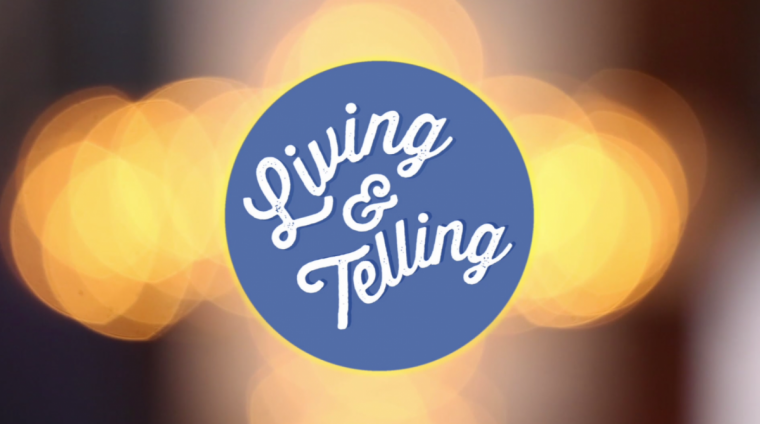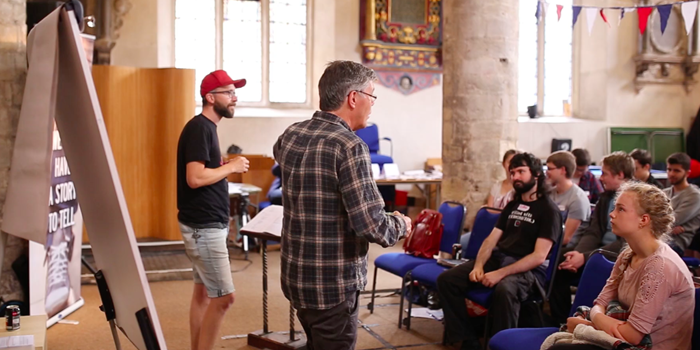Why we struggle to share our faith and what we can do about it

Tim Moyler, of Agapé UK, is passionate about helping Christians to share their faith. That's not because he's always been confident and fearless. By his own admission, he's had his fair share of struggles when it comes to telling others about Jesus.
But it's precisely because he knows how hard it can be that he wants to help those who find it a challenge.
For over a decade now, he's been involved in an programme at Agapé called Living and Telling that started off as a project to help young Christians going off to university feel more confident about talking with other students about their faith.
But it's become apparent that not only young Christians need help in this area and with that in mind, it's been adapted for use as a resource across the church spectrum, having just enjoyed its relaunch at the Christian Resources Exhibition.
Tim speaks to Christian Today about some of the common obstacles to our Christian witness and why even the most introverted Christian can become an effective communicator of the faith.
CT: Living and Telling was originally developed for young Christians. What need was it trying to address at that time?
Tim: Back in 2007, I was hearing stories of churched young people falling away from their faith while at university. They failed to connect with a local church or the university Christian Union and were being drawn into everything university life had to offer.
Our eldest son had just started uni and it got me thinking about how, as local churches, we were pouring so much effort into our young people but there still seemed to be a lack of confidence in students to live out and speak out about their faith.
Agapé UK had produced an excellent training course in 2004 called Living and Telling and I wondered if, by taking local 18-year-olds through this, it might help grow their confidence in engaging other students in spiritual conversations. That summer, I ran my first Living and Telling in South London. A lad who came to that course has just become Assistant Curate at a new HTB church plant here in Exeter and since that first course, others have gone on to lead university CUs and other national movements.
CT: It's since evolved to become a resource for all Christian adults. How did that come about?
Tim: Since moving to Devon in 2008, I've run Living and Telling in Exeter as a two day event, every summer, with my co-conspirator, Dave Pegg! We quickly formed a natural partnership and friendship as we shared the same concerns for the young Christians we knew. We wanted to send them off to college, uni or the workplace confident to hit the ground running and proactive in sharing the good news of Jesus wherever they were.
Even in those early days, older adults were asking if they could sit in on the course. One lady came in 2009 and went on to become a children and families worker. She wrote to me after the course, "Before I did Living and Telling, I had no idea how to start spiritual conversations with my friends. Now I've realised that simply 'Living' out my faith in front of them is more powerful than having Christian theology explained, and that 'Telling' my story of how God is working in my life is more meaningful than hearing a great evangelist speak."

Who is Living and Telling intended for? And is it for individuals or small group settings?
Tim: We're now saying that Living and Telling is for every Christian, whether you are 16 or 116. We've found that if you struggled to share your faith as a young adult, it doesn't tend to get any easier as you get older!
I became a Christian in 1975 and by the end of 1976 I was so discouraged by my efforts to get my friends and family excited by this Jesus, who had both saved and healed me, that I gave up. For 20 years I avoided every opportunity God gave me to engage in spiritual conversations. That was until my mate Paul dragged me to an earlier version of Living and Telling being run in Beckenham by an incredible team from Agapé UK.
I now relish being asked questions about my faith, even though I am far from being an expert in apologetics. And I now want every Christian I know to do Living and Telling, not least introverts like me! In fact, the introverts are the best Christians to reach introverts.
I would say it's definitely for groups to run rather than for an individual. Each of the highly interactive videos has a different presenter which keeps people engaged. Discipleship is woven through the whole course as we learn and grow together in the fun and adventure of sharing our faith.
CT: Why do you think Christians of all ages struggle to share their faith?
Tim: It could be a whole number of things: fears of inadequacy, lack of knowledge, getting it wrong, rejection, being embarrassed or spoiling a friendship. The list goes on.
We tackle this head-on in the first session. We try to be very honest as we ask each other "What holds you back?" and "What stops you from sharing him more?"
Back in 1976, I had made a mental list of all the reasons why I couldn't, and didn't need to share my faith. In every church I've been in, there always seemed to be "six people" who loved doing that sort of thing! I was happy to leave them to it, but I still carried a guilt that I had discovered the best news on planet Earth and was selfishly keeping it to myself.
Ultimately, though, the problem is a lack of training. Most Christians simply don't know how, or even where to start. I think we sit there on a Sunday morning assuming that we are the only ones not doing it. But the Evangelical Alliance's 2012 survey, "Confidently Sharing the Gospel", revealed that 87% of the Christians they surveyed "lacked confidence in talking about their personal testimony". Living and Telling not only inspires but it also equips. It also takes away the responsibility to achieve results. We want to replace the guilt of not sharing Jesus with a yoke that is easy and a burden that is light.
CT: What are some of the most common obstacles you have encountered to sharing faith effectively?
Tim: One of the biggest obstacles is me. I think we are good at overcomplicating things that Jesus made simple. Also, I used to think that the important thing was to communicate the truth of the Gospel. I now realise that people are far more interested in seeing that this Gospel works. That's what connects us, Christians or not, and wherever we may be on our spiritual journeys.
Another obstacle is that the church has, historically, had a habit of wobbling backwards and forwards between living out and telling of the good news. When I was a young Christian, it was all about getting the Gospel 'out' - leaving evangelistic tracts on bus seats and so on.
Over the last generation, we have found our way back to loving our neighbour - Street Pastors, food banks and Christians Against Poverty [debt support services] and what have you.
I love it all but I feel we have wobbled back too far the other way again. That 2012 EA survey also revealed that "57% of Christians feel they can share the gospel well without needing words."
I detect a massive hunger among church leaders to help church members regain a confidence in putting words to our actions.
CT: What are some of the remedies to these obstacles that you try to teach in Living and Telling?
Tim: We quickly start to ask the question, "What is your story?". Typically, group members will say they haven't got much of a conversion story, or maybe that they have always been a Christian and have never really thought about it. We unpack this stuff and get people to see that they don't need to be a Jackie Pullinger to have a story that some people are waiting to hear.
We help them to see that there are many people out there who are just like them and need to hear how we have battled through the same challenges that they have, but with Christ.
In another session we look at how the Holy Spirit truly is our best buddy when it comes to conversations about faith. We go back to the promises of Jesus in John 14-16. We find that this balance between training and Bible teaching is the encouragement that group members really enjoy. The course is so easy to run and because the videos do all the work, anyone can facilitate a course with no previous experience.

CT: We hear so much about people leaving the church. What is it that you think Christians need to be doing to reverse that trend?
Tim: I think many Christians feel a lack of purpose in attending church services. We have all read articles about how our consumer society is producing a consumer church. After the service it is so easy to slip into conversations about the preaching, the worship and even the coffee. Actually they are bored with having it all done for them.
A while back we decided to cancel the sermon and give the time over to allowing members to come forward and share what God was doing in their life and witness. We soon had a long queue and were hearing amazing testimonies that had been kept hidden.
I think we are now far better at keeping testimony centre to our worship, and trying to encourage every church member to participate. People on the fringes are loving our stories and it gives them friendly ways of connecting with church members. It now feels like we're all on an adventure together and can't wait to share our stories at coffee time, whatever the coffee tastes like.
CT: What do you hope will come of Living and Telling?
Tim: A few days ago, we launched the new version of Living and Telling at CRE National 2019. We had conversations with over 250 church leaders who saw that it was filling a gap. Whereas most (many brilliant) personal evangelism training courses assume a level of interest or desire in getting better at evangelism, Living and Telling assumes that maybe you don't want to do it at all!
Although one joked at our seminar, "This sounds like the holy grail!", at least Living and Telling has something for every Christian. It may not be the entire solution to the challenge of church growth in the UK, but I hope it will be a glimmer of hope to some who have become disheartened.
And I hope it will replace much of the negatives that Christians associate with evangelism with a fresh sense of fun and adventure together. It's totally free to download so people have got nothing to lose.











